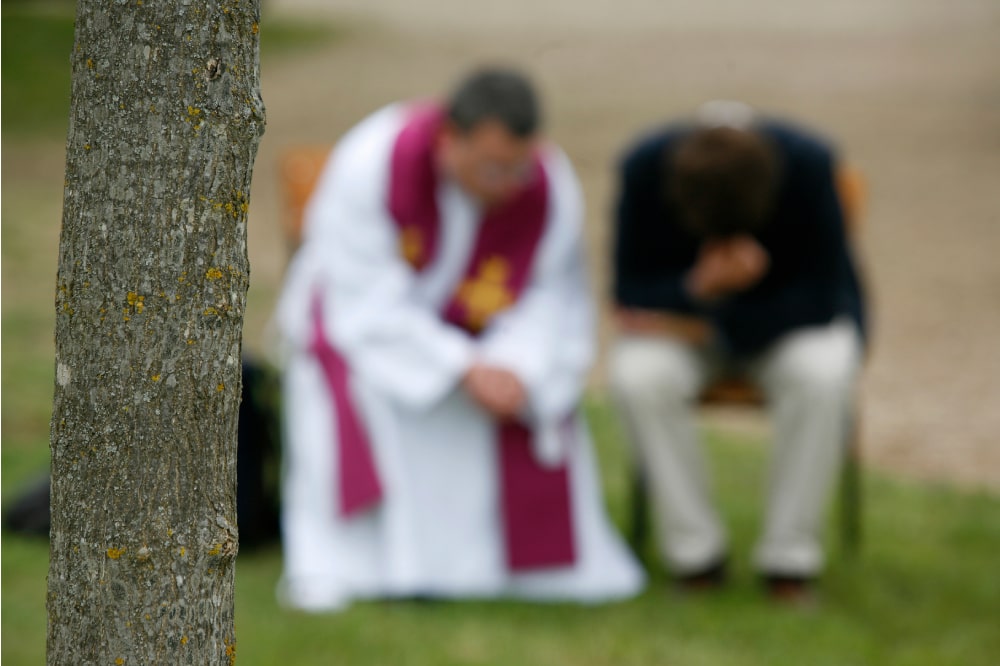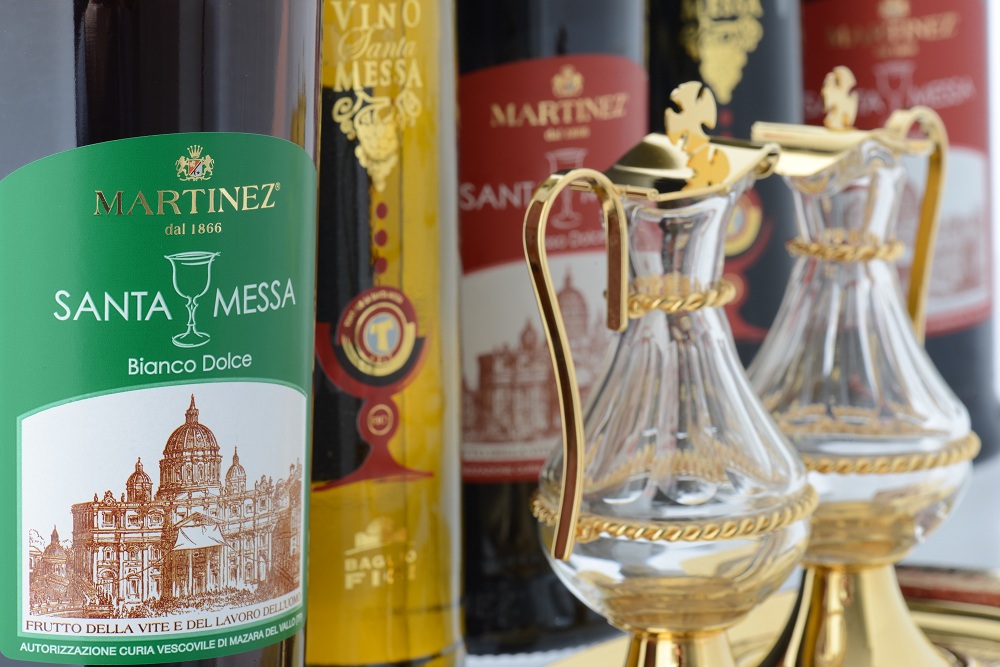Human nature, fallible and exposed to temptation, cannot be free from venial sins. How to free oneself from them, how to obtain forgiveness, and the differences between venial and mortal sins.
To sin is human. Or rather, it is human to be tempted by sin, induced to it by the allurements of the Evil One. But there is sin and sin. There are “venial sins“, which violate the measure prescribed by moral law and offend God, but which represent secondary transgressions compared to “mortal sins“, those for which one is banished from God’s Grace and sent to hell after death. This does not happen with venial sins, which cause only a temporary separation from Grace and can be cleansed from the soul with a temporary penalty.
But it is not right to underestimate venial sins. First of all, because, just as many drops of water form a sea and countless grains of sand form a desert, so a single venial sin may seem of little importance, but when venial sins begin to accumulate, their number is equivalent to a mortal sin.

Furthermore, it is true that venial sin, compared to a mortal sin, is lighter, but if we stop and reflect on what sin is, namely an offense to God, an act of disobedience, more or less serious, committed by us, fragile and pathetic beings, against God the Almighty Father, creator of everything, and against Jesus Christ, who sacrificed himself for us on the Cross, we realise the enormity of such a fault. Just thinking about this helps us understand how infinitely serious sin is, regardless of its definition, when compared to the One against whom we commit it.
And if it is true that, unlike mortal sin, which kills the soul of the one who commits it, making it empty and dead, venial sin only weakens it, scratches it, it remains true that indulging in venial sins, repeating them without showing signs of repentance, will cause a soul to wear out and lose itself beyond all mercy. This risk is real, if we consider that to err is human, to persist is diabolical, but it is against the devil and his infinite perseverance that we find ourselves fighting every day, so as not to sin.
It is also true that God, in His infinite mercy, gives men the chance to repent and correct their actions. This is taught by Saint Augustine, who in his “Confessions” narrated the story of his own conversion, how he chose to leave behind vice and sin to fully embrace God. This book remains a fundamental text because it shows how it is possible for anyone, at any moment, to decide to change their life, regardless of what we have done or what we were before.

The Confessions of Saint Augustine: How to Change Your Life
The Confessions of Saint Augustine are a timeless testimony of a journey of faith and self-awareness.
Let us now look at the differences between mortal and venial sins.
What are venial sins?
Venial sins are, therefore, those “minor sins” which do not cause complete separation from God and eternal damnation. Indeed, for some venial sins, it is enough to participate with the right disposition in “Holy Mass“, and they are forgiven during the “Eucharistic celebration“, when sacramental grace and sanctifying grace descend upon the faithful. Even making the Sign of the Cross or consciously reciting the Our Father can be enough to heal the wounds that a venial sin opens in our soul. However, the best way to cleanse oneself of sins is to approach “Confession” and the “Sacrament of Penance” that follows, because only a sacrament allows the grace of the Holy Spirit to descend upon the sinner, healing them and conforming them as a child of God.

Holy sinners: here are the most famous conversions
Holy sinners. A contradiction in terms? Not always. Here are the saints who converted after a life of sin
What are venial sins?
We can link sins to the “capital vices“, those character flaws or inclinations of the soul that drive men to behave in ways that harm themselves and those around them. It is often these vices that cause sin, which is an effect, a consequence of vice. The opposite of vices are “virtues“. The seven capital vices are called so because they generate other sins, other vices. Defined by Thomas Aquinas in the 13th century, they are:
- Pride
- Greed
- Lust
- Anger
- Gluttony
- Envy
- Sloth

The meaning of the seven Deadly Sins
What is the meaning of the seven Deadly Sins? Where do they come from and how were they defined throughout history?…
Venial and Mortal Sins: The Differences
For the Catholic Church, for a sin to be defined as “mortal“, meaning to lead the one who commits it to lose God’s Grace, it must meet three conditions simultaneously:
- It must be against one of the laws imposed by the Ten Commandments, that is, it must be a “grave matter“;
- It must be committed with full awareness or alertness of the mind;
- It must be committed with deliberate consent of the will.
It is Jesus himself who clarifies for us what the “grave matter” is mentioned in the Ten Commandments. In Mark 10:19, He advises the rich young man: “Do not kill, do not commit adultery, do not steal, do not bear false witness, do not defraud, honour your father and mother.” But a sin can be more or less serious depending on other factors, for example, who it is directed against. Doing harm to one’s parents is more serious than doing so to strangers. Then there are the so-called “sins that cry out to heaven”, according to catechism tradition, those sins that cry out for vengeance before God:
- Willful murder;
- Impure sin against the order of nature;
- Oppression of the poor;
- Defrauding the wages of workers.
Mortal sins break the full friendship with the Lord and place the one who commits them outside of God’s grace.
They can, however, be forgiven exclusively if confessed with a true spirit of repentance and through Baptism or sacramental Absolution (that is, the “Sacrament of Reconciliation“).
The only sin that God does not forgive is “blasphemy against the Holy Spirit“:
“Therefore I tell you, every sin and blasphemy will be forgiven men, but the blasphemy against the Spirit will not be forgiven. And anyone who speaks a word against the Son of Man will be forgiven, but anyone who speaks against the Holy Spirit will not be forgiven, either in this age or in the age to come.” (Matthew 12:31)
Venial sins, as we have already seen, can be purged with “Confession” and the subsequent “Penance“. In them, there is no grave matter, or if it exists, one of the other conditions listed for mortal sins is missing, namely awareness and/or consent. However, it is necessary to make a further distinction between “always grave matter” and “generally grave matter”. The first always defines a mortal sin, while the “generally grave matter” may conceal a mild matter and thus define a venial sin.
In summary, we commit a venial sin when:
- We commit bad actions, but those that have “insignificant matter” (the evil we do does not corrupt the good in its entirety);
- We commit actions that are lawful, but in a way that is not morally correct;
- We commit actions that have grave matter, with insufficient awareness of the mind or lack of full consent of the will.
Both mortal and venial sins can be forgiven through the “Sacrament of Reconciliation” or Penance. In the Catechism, we read:
“All the value of Penance consists in “restoring us to the grace of God” by drawing us close to Him in intimate and deep friendship. The purpose and effect of this sacrament is therefore reconciliation with God. Those who receive the Sacrament of Penance with a contrite heart and in a religious disposition achieve peace and serenity of conscience, along with a vivid consolation of the spirit. Indeed, the Sacrament of Reconciliation with God works a “true spiritual resurrection“, restores the dignity and the goods of life as children of God, of which the most precious is the friendship of God.”

Our Lady of Fatima: Penance and prayer are salvation
On 13 May we celebrate the Madonna of Fatima. Her invitation to penance and prayer as instruments…


























